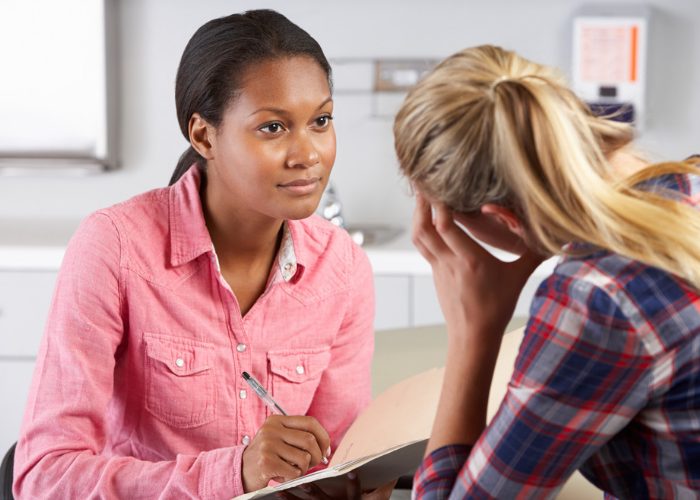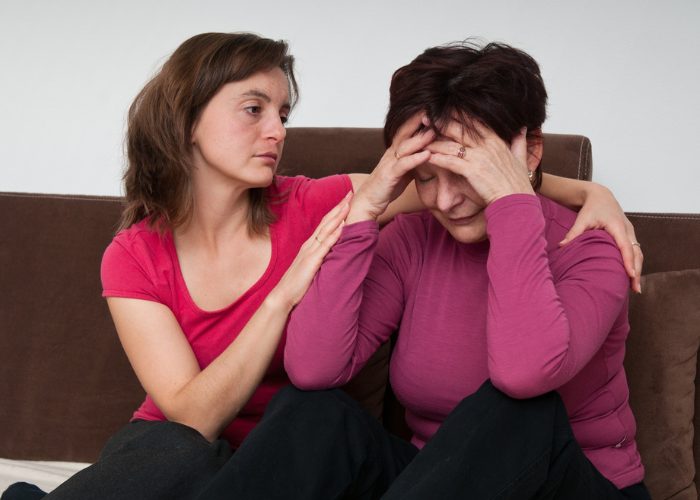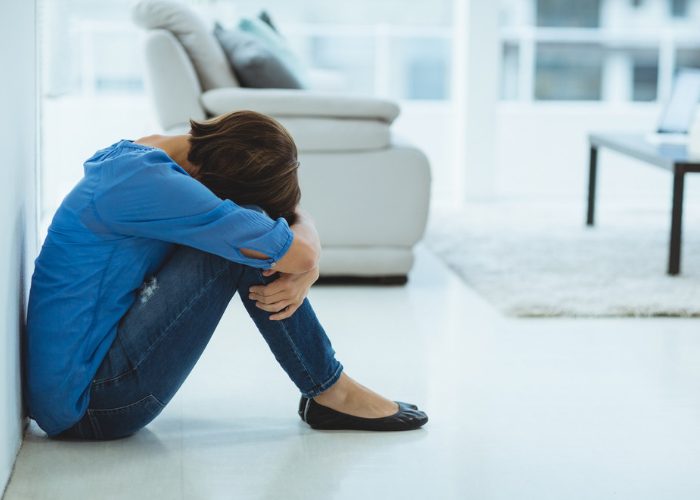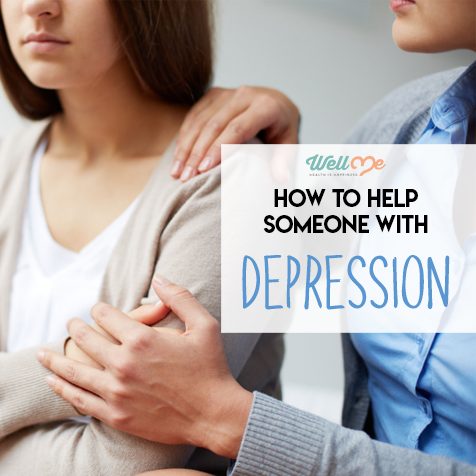Depression is not a dirty word. As one of the most common mental disorders in the world, it is likely that most of us will experience this problem at some point. However, knowing how to help someone with depression can be something of a minefield. If you’re unsure of where to start, or even what depression symptoms you should look for, you’ve come to the right place. In this guide, we will discuss the disorder in depth as well as look at how you can support your friend or loved one.
What is Depression?

Before you can understand how to help someone with depression, you should first gain an understanding of the mental illness. Depression is a medical problem that affects the way that you feel and your mood. The disorder affects around 16.1 million American adults and is the leading cause of disability for people between the ages of 15 and 44 years old.[1] What’s more, women are more likely to suffer from depression than men are.[2] That’s why we need to do all we can to safeguard ourselves against the problem.
Did you know women are more likely to suffer from depression than men?[3]
The two most common depression symptoms are feelings of sadness and a loss of interest in activities that you once enjoyed.[4] However, this is an immensely complex problem and one which can manifest in a variety of different ways, depending on the person suffering from it and their unique set of circumstances.
When left untreated, this mental illness can quickly lead to both a physical and mental decline, as well as issues functioning in the workplace and social situations.[5] Figuring out how to help someone with depression can be a real trial, but the sooner you equip yourself with the right tools, the easier you will find it.
Common Depression Symptoms to Look Out For
First of all, let’s talk about how you can recognize depression symptoms in your friend or loved one. While sufferers may not reach out directly regarding their struggle, paying close attention to them and understanding their feelings could be a step in the right direction. With that in mind, here are the main depression symptoms of which you should be aware, according to the American Psychiatric Association:[6]
Sadness or depressive mood

We all feel a little glum from time to time. However, if these feelings of sadness don’t naturally disappear after a few days or even weeks, that could be cause for concern.
Loss of interest in the activities you enjoy

Depressed people often find it hard to get pleasure from the activities that they once loved. For instance, your friend or loved one may have formerly enjoyed playing sports but no longer have an interest in doing so.
Fluctuations in appetite

One of the lesser-known depression symptoms is a change in appetite. A person may either start to eat more than they once did or eat very little. When you’re considering how to help someone with this mental health problem, look out for this key sign.
Sleep-related problems

In the same vein, a person struggling with depression may find that they have trouble getting to sleep or, equally, end up sleeping far too much at night. They could also sleep at unsociable hours of the day too.
Tiredness

It is quite likely that a person suffering from depression would struggle from fatigue or lack of energy. Of course, these depression symptoms are probably related to their sleep problems, which are symptomatic of the issue.
Fact: People struggling with depression often find it hard to deal with everyday tasks, such as work and social engagements.
Purposeless physical activity

At times, depressed people may have an increased amount of needless activity. For example, you may find that they pace the floor or fidget. On the other hand, they may be slower than usual when completing everyday tasks.
Feelings of guilt and/or worthlessness

Often enough, when people are experiencing depression, they will start to feel worthless or blame themselves for things. You may find that your friend or loved one begins to talk about feeling guilty or unworthy of love and support.
Lack of concentration

This mental illness doesn’t merely affect a person’s mood — it can also affect their thoughts. One of the main depression symptoms is a lack of concentration and trouble thinking straight. The person may also find that it is strikingly difficult to make even minor decisions.
Thoughts of committing suicide

In the most extreme cases of depression, a person may begin to consider committing suicide. Should you fear that your friend or loved one has these thoughts, you should seek external medical help. Working out how to help someone with depression can be tricky, but you should always seek extra support when needed.
Now that you’ve got a full grasp of depression symptoms, it’s time to take action. It’s important to keep in mind people who are depressed may find it difficult to reach out and ask for the help that they need. That’s why we should all gain an understanding of how to help someone with it.
How to Help Someone With Depression: What to Say & Do
Let’s not beat around the bush — when a friend or loved one has depression, knowing what to say or do can be tremendously hard. Luckily, when it comes to how to help someone with it, there are many expert-backed things you can do.

1. Educate yourself about depression
You’ve already started this one — the first step when you want to help a depressed person is to understand what they’re going through. Educating yourself about the disorder and how you can spot the main depression symptoms shouldn’t take you too long. You can use this guide as a starting point and do your own research too.
2. Show them that you’re there
Depressed people may feel isolated and alone. They could find it hard to reach out to people. Advice from the National Health Service (NHS) suggests that you should reach out to your friend or loved one — via text, call, or in-person — to let them know you’re thinking of them.[7] You don’t need to ask them any pressing questions. Instead, it could be as simple as letting them know that you’re there for them if they ever need someone to talk to.

3. Encourage them to live well
One of the most troubling depression symptoms is that people often stop looking after themselves. For instance, they may stop exercising, eat poorly, and find it hard to take care of their basic hygiene. The NHS also suggest gently encouraging your friend or loved one to make positive changes like cooking for themselves or going out for a run.[8]
You should avoid lecturing them or casting any judgment. Take things slow and give them the option to try these lifestyle changes for themselves. You may find that the best way in which you can help a depressed friend is to give them the tools to move forward. For instance, you could suggest ideas that will help them improve their life.
4. Be open about the problem
Mental health can be a difficult topic, but it doesn’t have to be a taboo. When you’re trying to figure out how to help someone with depression, opening an honest and safe dialogue about mental illness could be the answer. The mental health charity, Mind, suggests that you try to be as open as possible with the person suffering.[9] Let them know that it’s okay to talk about their feelings and how their mental health issues affect their life.

5. Avoid judging them
It’s hard to understand this mental illness if you don’t have first-hand experience of it. For that reason, the NHS recommends that you avoid judging them or criticizing them for their depression.[10] Try to remember that it is an illness and that the person suffering is likely doing their best to battle it at every turn.
6. Give balanced support
Depressed people often find it hard to do even the smallest of tasks. It’s only natural that you will want to help them out by doing small things for them, such as bringing them groceries. Make sure that the support you give is as balanced as possible. You should avoid falling into a pattern in which they become completely dependent on you and your help. The Mind charity recommends that you keep a balance and encourage them to do things for themselves too.[11]

7. Give them information about support and treatment
The truth of the matter is that you may not be equipped to help your depressed loved one or friend alone. Luckily, there are numerous of helplines and charities that could offer your friend or loved one some extra support. There is also the help they can get from medical experts, which is something you shouldn’t overlook.
Showing them various resources online, which we will list at the end of this guide, will show them where to gain information. You may want to encourage them to get treatment from a medical professional. If you do so, why not suggest going along to an appointment with them?
8. Figure out how to say the right thing
One of the biggest obstacles, when you’re dealing with a depressed friend, is knowing what to say. Mental health can be tough and, if you’ve not encountered someone with this issue before, you may not know where to start.
Not sure what to say to a depressed friend? Well, the advice and support you give should be open, not too pushy, and reassuring. Let’s take a look at some of the things that you might say to comfort someone with depression.
“Do you need me to help you?”
They also often feel too ashamed to ask for help. When you’re worried about how to help someone with depression, a simple solution may be to ask them what they need from you right now.
“I love/care for you.”

Letting your depressed friend know that you love and/or care for them might seem like a small gesture, but it could mean the world to them when they are feeling low.
“Do you want some time alone?”
On the other hand, you may find that your depressed friend is drained by social situations and too much attention. You should make it clear that you’re there for them while also offering them the space or time alone that they may need.
Did you know people with depression are also likely to suffer from anxiety-related disorders?[13]
“This is not your fault.”

Since one of the major depression symptoms is a sense of guilt, do what you can to alleviate that problem. For example, by telling the person that you don’t blame them or that their illness is not their fault, you take away any unnecessary onus.
“Things will be okay soon enough.”
Fear is a huge part of major depressive disorders. Almost half of the
“You’re not crazy.”

Sadly, there’s a massive stigma surrounding mental ailments, which means that people are often afraid of being labeled. Depression is an illness; it does not mean that a person is crazy. One of the most helpful things you can do is let your friend know that you understand that. Show them that you are not judging them and that you care for them.
“I’m here when you need me.”
Simply telling your friend that you are ready and waiting to help them may be enough. Accepting help from anyone can be a big step when you’re suffering from depression. Your loved one or friend may need time to come around to the idea. You should let them know that there is no time limit on your efforts and that you will always be there to help.
Self-Care Tips for Supporting a Depressed Friend or Relative

Above all else, there’s one golden rule: You can’t offer support to your depressed friend or relative until you look after yourself first. You need to be in a mentally stable and happy position before you can reach out to them. That’s why, when we talk about how to help someone with depression, we also have to incorporate some self-care. Here are some of the simplest tips you can apply to your own life.
1. Get the rest and relaxation you need

Helping your depressed friend or relative may have a negative impact on your wellbeing and the way that you feel. For that reason, you need to get some rest and relaxation. This could be as easy as taking some time to read a book, go for a swim, or having a nap. Making some time for yourself will mean that you can adequately decompress and unwind.
2. Avoid taking on your depressed friend’s problems
There’s a major consideration we often overlook when trying to support someone with depression — you may end up taking on your depressed friend’s issues. If they are venting their woes to you, you need to take a step backwards. Getting overwhelmed by their worries means that you will not be in a position to help them in the future.
3. Reach out to your social circle

You should never underestimate the value of social support. When you’re helping a depressed friend or relative, you may find that you begin to feel isolated and alone. Reach out to your loved ones and tell them what’s going on. As the time-old saying goes, a problem shared is a problem halved.
4. Understand that your feelings are valid
You might feel angry, upset, and frustrated when you’re talking to your depressed friend or relative. If it feels as though they are not helping themselves, you may find yourself struggling with your emotions. Recognize that they have an illness and that they are not trying to be purposely stubborn. However, you should also be aware that your feelings are valid and that you don’t have to be guilty about experiencing them.
Helpful Resources

- Mind. Looking for some extra information?
Mind is a charity offering a wealth of resources when it comes to mental health.[14] It even has information on how to help someone with depression and, crucially, how to take care of yourself. The easy-to-use website has an A-Z list of disorders so that you can gain an insight into each one.
- Beyond Blue. From online forums to general mental health information, the Beyond Blue site should be a go-to resource that everyone should know about.[15] On the main page, you will find many dropdown menus, offering various pieces of advice and help. There are details of how people can live well and look after themselves, as well as information on how to help a friend with depression.
- Suicide Prevention Lifeline. Since depressed people sometimes experience suicidal tendencies, the Suicide Prevention Lifeline is a vital resource.[16] Either you or your depressed friend can use the line to speak to someone who can help. Of course, the calls you make to this line are always 100% confidential.

Conclusion
Now that you know how to
help someone with depression, it’s over to you. Your support, love, and advice
could make a serious difference to how your friend or loved one feels. While
you can’t
expect miracles overnight, simply being there for them could be what they need
from you right now. Be patient with them and show that you are willing to do
the work alongside them. Now, reach out to the person in your life and make a
difference.
References
- [1] https://adaa.org/about-adaa/press-room/facts-statistics
- [2] https://adaa.org/about-adaa/press-room/facts-statistics
- [3] ADAA. https://adaa.org/about-adaa/press-room/facts-statistics
- [4] https://www.psychiatry.org/patients-families/depression/what-is-depression
- [5] https://www.psychiatry.org/patients-families/depression/what-is-depression
- [6] APA. https://www.psychiatry.org/patients-families/depression/what-is-depression
- [7] https://www.nhs.uk/conditions/stress-anxiety-depression/signs-someone-is-depressed
- [8] https://www.nhs.uk/conditions/stress-anxiety-depression/signs-someone-is-depressed
- [9] Mind. https://www.mind.org.uk/information-support/types-of-mental-health-problems/depression/for-friends-and-family/#.XEhTtC2cZdg
- [10] https://www.nhs.uk/conditions/stress-anxiety-depression/signs-someone-is-depressed
- [11] https://www.mind.org.uk/information-support/types-of-mental-health-problems/depression/for-friends-and-family/#.XEhTtC2cZdg
- [12] ADAA. https://adaa.org/about-adaa/press-room/facts-statistics
- [13] https://adaa.org/about-adaa/press-room/facts-statistics
- [14] https://www.mind.org.uk
- [15] Beyond Blue. https://www.beyondblue.org.au
- [16] https://suicidepreventionlifeline.org








